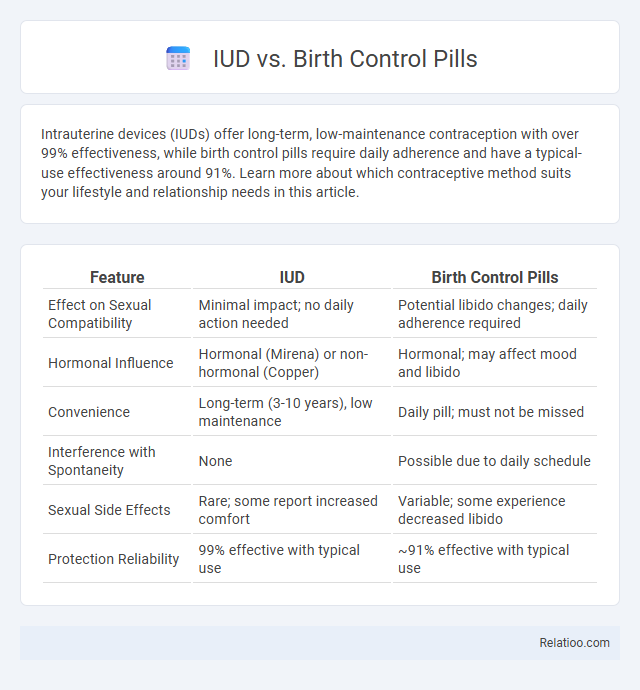Intrauterine devices (IUDs) offer long-term, low-maintenance contraception with over 99% effectiveness, while birth control pills require daily adherence and have a typical-use effectiveness around 91%. Learn more about which contraceptive method suits your lifestyle and relationship needs in this article.
Table of Comparison
| Feature | IUD | Birth Control Pills |
|---|---|---|
| Effect on Sexual Compatibility | Minimal impact; no daily action needed | Potential libido changes; daily adherence required |
| Hormonal Influence | Hormonal (Mirena) or non-hormonal (Copper) | Hormonal; may affect mood and libido |
| Convenience | Long-term (3-10 years), low maintenance | Daily pill; must not be missed |
| Interference with Spontaneity | None | Possible due to daily schedule |
| Sexual Side Effects | Rare; some report increased comfort | Variable; some experience decreased libido |
| Protection Reliability | 99% effective with typical use | ~91% effective with typical use |
Overview: IUD vs Birth Control Pills
Intrauterine devices (IUDs) provide long-term, reversible contraception by releasing hormones or using copper to prevent pregnancy, offering over 99% effectiveness with minimal daily maintenance. Birth control pills require daily intake of hormones to inhibit ovulation, with effectiveness around 91% when typical use is considered, but they offer more control over menstrual cycles and hormonal balance. Both methods vary in side effects, cost, ease of use, and suitability depending on individual health conditions and lifestyle preferences.
Mechanism of Action: How They Work
IUDs work by releasing hormones or using copper to create an environment that impairs sperm mobility and fertilization, with hormonal IUDs also thinning the uterine lining to prevent implantation. Birth control pills primarily use synthetic estrogen and progestin to inhibit ovulation, thicken cervical mucus, and alter the uterine lining, reducing the chance of pregnancy. Understanding your body's response to these mechanisms helps you choose the most effective birth control method for your lifestyle and health needs.
Effectiveness Rates: Preventing Pregnancy
IUDs offer over 99% effectiveness in preventing pregnancy, making them one of the most reliable long-term birth control options available. Birth control pills have a typical-use effectiveness rate of around 91%, largely dependent on consistent daily use. Your choice of birth control method should consider these rates alongside personal preferences and lifestyle factors to ensure optimal prevention.
Types of IUDs and Birth Control Pills
IUDs are primarily divided into copper IUDs, which provide hormone-free contraception by creating a toxic environment for sperm, and hormonal IUDs that release progestin to thicken cervical mucus and suppress ovulation. Birth control pills come in two main types: combined oral contraceptives containing estrogen and progestin, and progestin-only pills, each tailored to different hormonal needs and health profiles. Understanding these distinctions helps optimize contraceptive effectiveness while addressing individual health considerations.
Side Effects and Health Risks
IUDs typically cause side effects like cramping and irregular spotting initially but have lower hormone-related risks compared to birth control pills, which may increase the likelihood of blood clots, stroke, and hormonal imbalances. Hormonal birth control pills often carry risks such as nausea, weight gain, and mood changes, whereas non-hormonal methods like copper IUDs avoid these but can increase menstrual bleeding and cramps. Your choice should consider these health risks and side effects in relation to your medical history and lifestyle preferences.
Convenience and Usage Frequency
Intrauterine devices (IUDs) provide long-term contraception with minimal daily attention, requiring insertion by a healthcare provider and lasting 3 to 10 years depending on the type. Birth control pills demand strict daily adherence for effectiveness, increasing the risk of missed doses and reduced efficacy. Other birth control methods vary in convenience and frequency, but IUDs rank highest for low-maintenance usage, whereas pills require consistent, daily management.
Cost Comparison and Insurance Coverage
IUDs typically have a higher upfront cost, ranging from $500 to $1,000, but offer long-term savings as they last 3 to 10 years, whereas birth control pills cost around $20 to $50 per month, accumulating to $240 to $600 annually. Insurance plans often cover both IUDs and birth control pills under preventive care without co-pays due to the Affordable Care Act, but coverage specifics can vary, affecting Your out-of-pocket expenses. Evaluating cost-effectiveness depends on your usage duration and insurance benefits, making it crucial to verify your policy's coverage for these contraceptive options.
Reversibility and Fertility After Stopping
IUDs offer long-term, reversible contraception with fertility typically returning quickly after removal, often within one to two menstrual cycles. Birth control pills require daily use and may delay ovulation resumption slightly after stopping, but most users regain fertility within a few months. Your choice between IUDs, birth control pills, or other methods should consider how soon you plan to conceive after discontinuation.
Suitability: Who Should Consider Each Option?
IUDs are suitable for individuals seeking long-term, low-maintenance contraception and those who prefer a hormone-free option or have contraindications to estrogen. Birth control pills work well for individuals who want flexible, reversible methods with cycle regulation benefits and do not have risk factors like smoking over age 35 or a history of blood clots. Birth control methods overall should be selected based on personal health, lifestyle, and convenience, with consultation from a healthcare provider to match the best option to individual medical history and reproductive goals.
Myths and Facts: Debunking Common Misconceptions
IUDs, birth control pills, and other contraceptive methods often face myths such as IUDs causing infertility, birth control pills leading to cancer, or all hormonal methods causing significant weight gain. Scientific studies confirm that IUDs are safe and reversible, birth control pills do not increase cancer risk overall, and weight changes linked to hormonal contraceptives are typically minimal and vary by individual. Understanding these facts helps dispel misconceptions and promotes informed choices about effective contraception options.

Infographic: IUD vs Birth Control Pills
 relatioo.com
relatioo.com